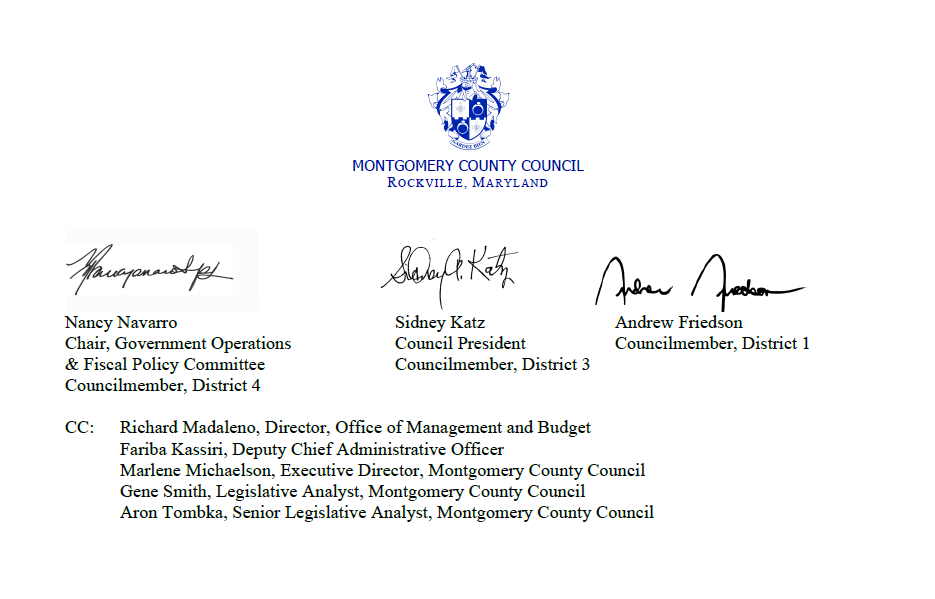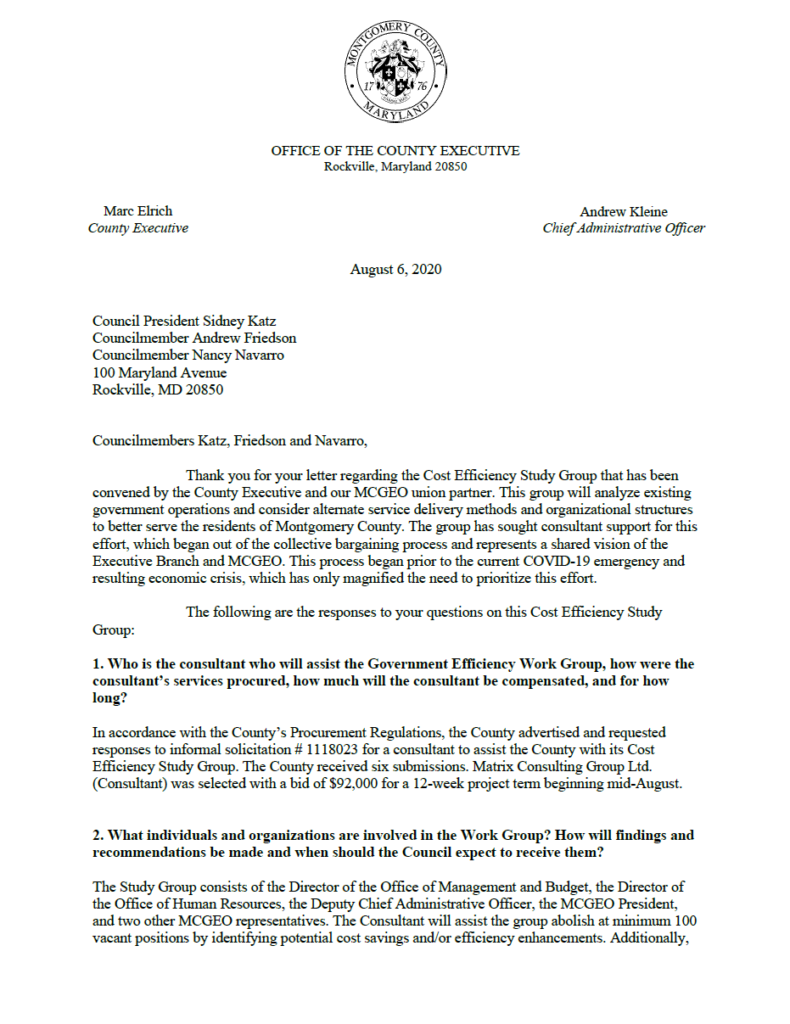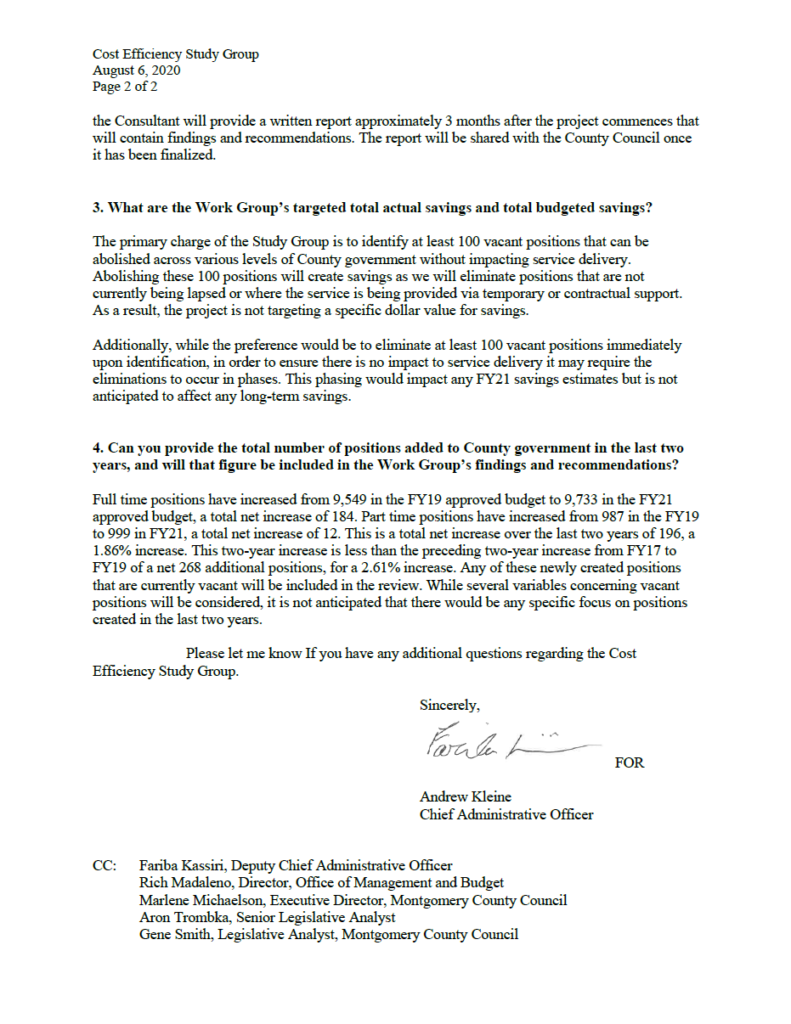By Adam Pagnucco.
Dear readers, let’s consider the following sequence of events.
2018: County executive candidate Marc Elrich campaigns on a platform of restructuring government. Elrich writes in the Washington Post:
Far from saddling taxpayers with higher bills, I will streamline county government. Unions and their members, our county’s workforce, know and trust me. That is why we announced our plan to restructure county government together. Our county is facing difficult financial times; without thoughtful changes, employees will face across-the-board cuts.
August 2019: The three county employee unions, who expected to partner with Elrich to restructure government, blast Chief Administrative Officer Andrew Kleine in writing for “hindering progress” in labor relations. Kleine, the administrative head of county government, was supposed to be a key player in restructuring.
2019-2020: Instead of streamlining government, Elrich recommends two budgets that cumulatively add 271 full-time equivalent positions to county government at a combined cost of $58 million. After trims by the county council, the two approved budgets during Elrich’s tenure add a combined 184 full-time positions and 12 part-time positions.
March 2020: Elrich recommends a budget that adds positions and raises taxes despite repeated campaign pledges to not raise taxes. The county council immediately rejects the tax hike and later implements a same services budget.
April 2020: The county’s finance department estimates that the county could lose up to a combined $600 million in the current and next fiscal years. A later estimate in July is in the same ballpark.
June 2020: The county advertises and requests responses to informal solicitation #1118023, a consultant contract for “Cost Efficiency Study Group Consulting Services.”
July 2020: The county’s budget director informs the county council about the consulting contract and its relationship with a new “government efficiency work group.” This prompts a letter to Kleine by the three members of the council’s Government Operations Committee, Nancy Navarro (chair), Andrew Friedson and Sidney Katz, asking about the identity and compensation of the consultant, the membership of the work group and prior additions of positions in the budget.
July 2020: Kleine admits to two ethics violations and the county council erupts in outrage, putting the future of Elrich’s top manager in doubt.
August 6, 2020: Kleine’s deputy, Fariba Kassiri, replies to the council with the following information: the consultant, Matrix Consulting Group Ltd., will be paid $92,000 for a twelve-week period beginning this month to advise a “cost efficiency study group” containing county government officials and representatives of the county’s largest employee union (MCGEO). “The Consultant will assist the group abolish at minimum 100 vacant positions by identifying potential cost savings and/or efficiency enhancements. Additionally, the Consultant will provide a written report approximately 3 months after the project commences that will contain findings and recommendations. The report will be shared with the County Council once it has been finalized.”
So let’s summarize. After doing nothing to restructure government for a year and a half, the administration will be paying a consultant $92,000 to help it eliminate 100 or more vacant positions after it has already added almost 200 positions in the last two budgets.
By definition, vacant positions do not have a cash cost since no one earning salary and benefits occupies them. How does eliminating them save cash? And since the county’s budget office already tracks these positions, why is a consultant necessary for identifying them?
In reading the administration’s response, I am reminded of the Leggett administration’s elimination of nearly 1,000 positions from Fiscal Year 2009 through Fiscal Year 2012 during the Great Recession. That was done mostly through attrition since roughly 6% of the workforce, or 500-600 positions, turn over each year. I could be wrong, but I worked at the county council for part of that time and I don’t recall that process being driven by consultants.
The very concept of spending money on a consultant to save zero money by eliminating vacant positions – something the county can do and has done by itself – is totally banana cakes. If this is how county management intends to address the hundreds of millions of dollars in lost revenue which will soon come due, then the county council’s bloody meat axe awaits.
The council’s letter and the administration’s answer (mysteriously not signed by Kleine) appears below.




